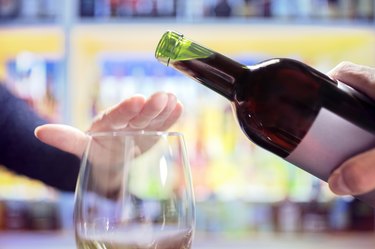
When most people clean up their diets to lose weight or boost their overall health, one of the first things they're told to cut out is alcohol. After all, no amount of alcohol is particularly "good" for you, per an August 2018 analysis in The Lancet — and it's certainly not low in calories, no matter which type you're sipping.
But for many, a glass of wine or a cold beer at the end of a long workday is a go-to way to de-stress and unwind. And that's nothing to sneeze at, because lowering your stress levels can be key for weight loss, too.
Video of the Day
Video of the Day
The Problem With Alcohol as a Stress-Reliever
While a casual drink may seem harmless, there's often a biological component at play that keeps alcohol at the top of the list of favorite de-stressors, Roger Adams, PhD, personal trainer, doctor of nutrition and owner of eatrightfitness, tells LIVESTRONG.com.
"At its basic level, alcohol of any kind is a depressant, meaning it slows down the activity and processes of the brain and central nervous system," Adams says. "If used only occasionally for stress relief, alcohol is likely to be quite effective in the short-term. However, we tend to need to consume more over time to get the same de-stressed feeling, so consumption is likely to increase."
This increased alcohol consumption over time can cause myriad health problems, including mood and behavior disruptions, high blood pressure, stroke, liver disease and even cancer, according to the National Institute on Alcohol Abuse and Alcoholism.

On the other hand, stress is also a major health issue. One March 2018 study in the journal Psychological Science found that even stress that is seen as small and insignificant can lead to health problems including heart disease, anxiety and depression, chronic pain and more.
Another November 2018 study in Neurology discovered that a high-stress lifestyle could lead to memory loss and brain shrinkage before the age of 50.
And, like alcohol, stress doesn't help your waistline either. Those who have long-term stress are more likely to have obesity, according to a February 2017 study in Obesity. The main culprit is cortisol, a stress-induced hormone that can encourage your body to hold onto fat.
Read more: 8 Ways to Beat Stress-Induced Belly Fat
In short: If both stress and drinking are bad for you, the healthiest lifestyle is one that includes less of both.
Luckily, there are plenty of stress-relieving solutions that can help you whittle your waistline and boost your health. Here, experts share their science-backed alternatives to drinking that can still help relieve stress.
8 Healthy Alternatives to Alcohol That Help You De-Stress
1. Take a Walk in Nature
Exposure to nature has a lot of benefits, including a better mental state of wellbeing as you leave all the noise of life behind, Adams says.
This was shown in a small July 2015 study published in Proceedings of the National Academy of Sciences, which examined brain activity and ruminating thoughts after a 90-minute walk. Participants who walked in nature reported less rumination (which is linked to a higher risk of depression) and calmer brain activity than people who walked in an urban setting.
So instead of happy hour after work, suggest taking a walk or throwing a frisbee in the park with your pals, or simply take a walk through the trees after dinner instead of parking yourself on the sofa with a cold one.
2. Try Meditating
Meditation can be a powerful stress-reliever, according to a systematic review and meta-analysis published March 2014 in JAMA Internal Medicine. After reviewing 47 trials, the researchers concluded that mindfulness meditation can improve levels of anxiety, depression and pain as well.
Another study, published July 2019 in Scientific Reports, found that it takes as little as 40 days of meditating to change your brain waves enough to improve stress.
"Progressive relaxation meditation involves a guided experience where you relax each part of your body, as well as calm the inner chatter that often feeds stress and worry and keeps us too stimulated for sleep," Roseann Capanna-Hodge, PsyD, psychologist and certified integrative medicine mental health provider, tells LIVESTRONG.com.
Read more: 4 Reasons Sleep Is So Important for Weight Loss
One of the best parts about meditating is that it's easy to do anywhere — all you need is a safe and quiet place to sit, reflect and calm your mind. If you're looking for a little guidance, consider downloading one of the many meditation apps out there, such as InsightTimer or Calm.

3. Do Some Yoga
Like meditation, yoga is a good alternative to drinking that can provide boundless benefits for the body and mind, particularly when it comes to reducing levels of stress, anxiety and depression, per a February 2018 study in the International Journal of Preventive Medicine.
"By performing yoga moves and breathing properly, you can promote your mental health through the relief of stress," Jamie Bacharach, medical acupuncturist and yoga practitioner, tells LIVESTRONG.com. "Due to its use of meditation-like posing and deliberate breathing, yoga has the ability to increase your own body awareness, relax the mind and give you a sharper focus, all of which contribute to optimized mental health."
Get Started With Yoga
New to the practice? Here's everything you need to know, including the best yoga poses for beginners.
4. Visualize Your Goals
Being mindful of one's surroundings and using visualization to reduce stress has become an increasingly popular technique. Though it sounds quite similar, visualization is different than mindfulness or meditation.
"Visualization involves actually visualizing what you want and honing in on one's authentic purpose to create goals around it," explains Dr. Capanna-Hodge. "It's a powerful way to not only get clarity on your goals but to help manifest them."
To incorporate visualization into your day-to-day, Dr. Capanna-Hodge suggests taking a few minutes to sit in a quiet place and visualize what you want to accomplish and pair it with action around those goals that move them to positive outcomes.
"Whether you have a goal to better manage stress or address a specific issue, intent-oriented visualization is a great way to create positive momentum by getting to the core of the issue and its resolution," she says.
"The lasting effects throughout the day of a short workout can provide the calming effect that you may be looking for in that after-work cocktail."
5. Exercise
It might sound simple — and it is — but getting your heart rate up is one of the best ways to reduce the effects of stress.
When you exercise, your body amps up its production of the "feel-good" hormone known as endorphins, while stress does the complete opposite, explains Joseph De Santo, MD, board-certified physician and addiction specialist for the BioCorRx Recovery Program.
Indeed, in responses gathered for the American Psychological Association's Stress in America 2019 survey, a whopping 53 percent of adults reported that they feel good about themselves after exercising, and 30 percent reported feeling less stressed.
Read more: 7 Workout Classes That Will Bust Your Stress
"No matter what you are doing, if you are moving, oxygen is getting to the brain more efficiently and endorphins are being released," Dr. De Santo says. "The lasting effects throughout the day of a short workout can provide the calming effect that you may be looking for in that after-work cocktail."

6. Use Essential Oils
Essential oils not only smell nice, but they can have a beneficial effect on both your brain and body.
Lavender oil in particular, has been shown to help alleviate symptoms of anxiety, according to one July 2017 study published in The Mental Health Clinician.
"When essential oil molecules enter the nose or mouth, they pass to the lungs and eventually the brain and other parts of the body, stimulating the olfactory system, which is the part of the brain connected to smell," Dr Capanna-Hodge explains. "As the molecules reach the brain, they affect several regions, including the limbic system, which is linked to the emotions, our memory and attentional systems, as well as our hormone and immune systems, and can lower cortisol and stress levels."
She recommends using an infuser to disperse essential oils around your home or workplace to keep your stress levels low and your body relaxed.
7. Take Magnesium
This nutrient has numerous health benefits, including enhancing bone health and reducing one's risk for diabetes, heart disease and anxiety. It also has impressive stress-relieving perks, as shown in a May 2017 study published in Nutrients, which found magnesium supplementation to be beneficial in relieving anxiety as well as stress.
"By supplementing with magnesium, you not only calm the nervous system, you help your body combat stress and give it what it needs to work at an optimal level," says Dr. Capanna-Hodge.
You can take a magnesium supplement, but you can also score the nutrient in certain foods, particularly spinach, almonds, avocado, tofu and dark chocolate.
Tip
Keep in mind the recommended daily intakes for magnesium, according to the National Institutes of Health:
- Ages 19-30: 310 mg for women, 400 mg for men
- Ages 31+: 320 mg for women; 420 mg for men
- Pregnant and lactating women should speak with a doctor before adding a magnesium supplement or making dietary changes
8. Get More Sleep
Most Americans (1 in 3) are not getting their fair share of shut-eye — and it's having a negative affect on their health and overall wellbeing, according to the Centers for Disease Control and Prevention.
What's more: Oftentimes stress is the cause of inability to sleep well. A National Sleep Foundation poll found that 43 percent of young and middle-aged adults report difficulty sleeping at night as a result of stress at least once a month.
"Getting to bed and getting enough sleep for four to five REM cycles (typically six hours minimum) can provide your brain the healing time that allows it the chance to re-organize and refresh, so you don't carry stress over from the previous day," Dr. De Santo says.
Trouble Falling or Staying Asleep?
Try these 5 simple steps to get the best night of zzzs ever.
- The Lancet: "Alcohol use and burden for 195 countries and territories, 1990–2016: a systematic analysis for the Global Burden of Disease Study 2016"
- National Institute on Alcohol Abuse and Alcoholism: "Alcohol's Effects on the Body"
- Psychological Science: "Let It Go: Lingering Negative Affect in Response to Daily Stressors Is Associated With Physical Health Years Later"
- Neurology: "Circulating cortisol and cognitive and structural brain measure"s
- Obesity: "Hair cortisol and adiposity in a population‐based sample of 2,527 men and women aged 54 to 87 years"
- JAMA Internal Medicine: "Meditation programs for psychological stress and well-being: a systematic review and meta-analysis."
- Scientific Reports: "Alterations in Brain Structure and Amplitude of Low-frequency after 8 weeks of Mindfulness Meditation Training in Meditation-Naïve Subjects"
- International Journal of Preventive Medicine: "The Effect of Yoga on Stress, Anxiety, and Depression in Women"
- American Psychological Association: "Stress in America 2019"
- Mental Health Clinician: "Essential oil of lavender in anxiety disorders: Ready for prime time?"
- Nutrients: "The Effects of Magnesium Supplementation on Subjective Anxiety and Stress—A Systematic Review"
- Centers for Disease Control and Prevention: "Short Sleep Duration Among US Adults"
- National Sleep Foundation: "Sleepy Connected Americans"
- National Institutes of Health, Office of Dietary Supplements: "Magnesium"
- Proceedings of the National Academy of Sciences: "Nature experience reduces rumination and subgenual prefrontal cortex activation"